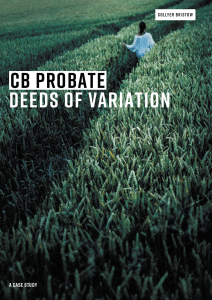
The Team
Our lawyers have the expertise and experience to provide you with creative, personalised solutions in a clear and understandable way.
Our Publications
Discover a wealth of invaluable guidance in the form of guides and brochures written by our expert lawyers.
Pricing information
Learn more about our costs, based on our experience of typical transactions or cases. The actual charges may vary, for example, if your case is more or less complex.
About
Personal service when it is needed most
Our probate solicitors provide practical, tailored advice to families, executors and beneficiaries on the administration of estates after death. This could involve the transfer of assets to future generations or ensuring a family business continues running or is passed to a child or spouse. People’s lives can be complicated. The estates we deal with are often complex, high value and span across multiple jurisdictions; but we also deal with relatively smaller estates where the value of the estate is under the nil rate bands and therefore no inheritance tax is payable.
We advise on business, agricultural and heritage property reliefs from inheritance tax and post-death variations, as well as preparing inheritance tax accounts, obtaining grants of probate and negotiating valuations with HMRC. Our team has significant experience in dealing with cross-border succession issues. Working closely with advisers in other jurisdictions, we make sure that estates are administered in a coordinated way, obtaining UK grants for foreign people who died owning UK assets, and re-sealing Commonwealth grants and English grants overseas.
See our Probate FAQs.
How we help
We can help with and advise on any of these duties including:
– Applying for Grant of Probate
– Valuing the estate
– Collecting the estate funds
– Preparing the inheritance tax return and paying any taxes due
– Selling or transferring ownership of property and assets
– Estate administration
– Resealing grants issued by foreign probate registries
– Deeds of variation to change a beneficiary’s entitlement post-death
Please visit our price & service information page for more information regarding these services.
Should you require assistance from our private wealth disputes lawyers, please visit the following page.
Peter DanielPartner - Head of Private Wealth
+44 20 7468 7351+44 7879 842645peter.daniel@collyerbristow.com
Caroline HollisChartered Legal Executive (FCILEx)
Francis MerrittChartered Legal Executive
+44 20 7470 4529 +44 7947 532112francis.merritt@collyerbristow.com
Spotlight
Post death variations
Post death variations can help to achieve an outcome for succession and tax purposes which is in the best interests of the family and beneficiaries. We are often instructed by clients to redirect assets they have inherited by will or intestacy. These variations might include increasing individual cash legacies, ensuring that tax exemptions and reliefs are utilised, for example by varying the terms of an intestacy where the deceased was survived by their spouse and children.
Services
We support our clients with individually tailored legal advice, in areas such as:
International probate
International probate happens when the deceased lived in one country but owned assets in another. For example:
- UK nationals who owned assets abroad
- Foreign nationals who lived in the UK but were resident overseas for tax purposes
- Expats who retained property and assets in the UK
International probate is more complicated than domestic probate as the authority granted to an executor or administrator in one country may not automatically be recognised in another country.
For example, if a grant of probate is issued outside of the UK, the grant usually needs to be “resealed” by the Probate Registry before it can be used to deal with property, investments and bank accounts in the UK. When assets are located in multiple jurisdictions, your solicitor will have to coordinate a number of different representatives and court permissions.
By its nature, international probate will also involve at least two sets of taxes to pay, i.e. UK taxes and those of the relevant foreign jurisdiction(s). Navigating the different tax regimes alone can be time-consuming, but our experienced solicitors have the specialist knowledge to assist. We have particular depth in UK/US probate matters and can help UK executors and beneficiaries ensure the deceased’s wishes are carried out efficiently when dealing with assets across the pond.
If your loved one had interests in more than one country, get in touch. Our cross-border probate team can offer expert advice on international probate, property sales, trusts, taxation and wealth management structures with optimum efficiency and the minimum of fuss.
Probate property sales
Probate property sales can involve different procedures than other property transactions. While an executor can place a property on the market immediately, they will need to obtain a Grant of Probate before they can complete the sale. The executor may have to balance their desire to sell the property quickly against achieving a good price; they also must accept the highest offer for the property which can add to the complexity of a sale.
The sale of property during probate may have Inheritance Tax consequences and may trigger a charge for Capital Gains Tax if the property’s value rose since the person died. CGT is not normally payable by the estate where property is transferred straight to a beneficiary. In any event, it’s important to consider the tax aspects of your particular sale to ensure you are not paying more tax than necessary.
Our probate solicitors work hand-in-hand with our real estate team and are experienced in dealing with both residential and commercial property sales. We can help you manage any probate property sale quickly and efficiently, optimise your timing, and advise on the tax implications to ensure that your estate is not paying more than it needs to.
Deed of variation
Sometimes, the beneficiary of an estate may want to redirect their inheritance away from themselves and towards someone else – for example, by gifting part of their legacy to charity or another person. This is possible with a Deed of Variation.
WHAT IS A DEED OF VARIATION?
A Deed of Variation is a legal document that allows one or more of the beneficiaries to change their entitlement under the will or under the intestacy rules (if there is no valid will).
As long as the Deed of Variation is completed within two years of the date of death, the changes will be treated as if they were written into the will for inheritance tax purposes.
WHY WOULD YOU WANT TO VARY A WILL AFTER DEATH?
While everyone’s situation is different, the most common reason for signing a Deed of Variation is to distribute assets more equitably. Here are some examples:
- A beneficiary does not need their inheritance so chooses to redirect it to someone else
- The will does not reflect the current family or personal circumstances, such as a new relationship or grandchildren who were born after the will was written
- The family wants to provide for someone not covered by intestacy rules, such as unmarried partners
- Donating to charity
- To save Inheritance Tax and/or Capital Gains Tax, allowing more money to pass to the beneficiaries
This is not a complete list. Our probate solicitors can help you understand the implications of varying a will and how that can be achieved in your situation.
WHAT CHANGES CAN I MAKE?
Beneficiaries can only make changes to their own share of the inheritance, for example by:
- Giving away some or all of their share
- Redirecting specific assets to other people
- Setting up a trust.
Since beneficiaries can only deal with their share, there are certain changes that cannot be made. For example, a beneficiary cannot unilaterally decide to give themselves a larger share of the estate, change other people’s inheritance, or remove or replace the executors or guardians named in the will.
Subject to these restrictions, the exact terms of the Deed of Variation can be tailored to fit your specific situation.
WHAT IF THE BENEFICIARIES CANNOT AGREE?
Often, the beneficiaries will come together and alter everyone’s inheritance in one document to achieve a fair result. Before making any changes, it’s important that everyone understands the consequences.
This includes the executor, who may have a higher Inheritance Tax bill to pay.
If the beneficiaries and executor cannot agree on the changes, then you may need the help of a dispute resolution specialist to help you resolve the disagreement. Our experienced probate solicitors can help you navigate whatever situation you find yourself in and advise the best way forward.
HOW LONG DOES IT TAKE TO GET A DEED OF VARIATION?
Provided all parties agree, it usually takes 2-4 weeks to complete a Deed of Variation. If any of the beneficiaries are not legally able to sign the Deed, such as if they are minors or mentally incapacitated, an application to the Court is needed which can add to the timeframe.
For tax reasons, you must complete the changes within two years of the person’s death. However, the sooner you sign the Deed of Variation, the better. The executor will need to provide a copy of the deed to HMRC so that the estate can be taxed correctly.
If you want to use a Deed of Variation, it’s important to get legal advice. The wording of the deed must be precise, and certain conditions must be met for it to be legally binding. Our probate solicitors can help you make sure your documents are completed correctly and the changes you’re making are best for the estate.
Probate Publications

Resealing foreign grants of probate
Our experienced team offers you and your clients clear and competitive pricing and a clear and efficient timeline.

Deeds of Variation:A Case Study - A Case Study
A case study of how a deed of variation, if completed within two years of the date of death, can “change the narrative” of a will and/or the distribution of an estate generally to put the beneficiaries in a better position.

Valuations of Art:An overview - An overview
When administering an estate, the deceased’s personal possessions can often present challenges, both in terms of the disagreements among family members over sentimental items and valuing unique works of art or antiques. This guide explains more.

Cross-Border Estate Administration
Estates with cross-border aspects can present various complexities to be navigated. This guide provides an overview of the key issues and why it can be prudent to seek advice before proceeding.
Probate insights
Shorter Reads
The perils of making a fortune at a tender ageThe perils of making a fortune at a tender age
Read more
Longer Reads
Clitheroe v Bond case: providing clarity for practitionersClitheroe v Bond case: providing clarity for practitioners
Read more
Longer Reads
Making a success of UK-US cross-border estate planningMaking a success of UK-US cross-border estate planning
Read more
Shorter Reads
Q&A: My father has left his home to me and my siblings. What will it cost to buy out my siblings?Q&A: My father has left his home to me and my siblings. What will it cost to buy out my siblings?
Read more
Shorter Reads
Why you will no longer need to swear when visiting your solicitorWhy you will no longer need to swear when visiting your solicitor
Read more
Shorter Reads
Can my half-sister challenge our father’s will?Can my half-sister challenge our father’s will?
Read more
You might also like
Need some more information? Make an enquiry below
Probate key contacts
- Peter
DanielPartner - Head of Private Wealth
Talk to Peter about UK trusts, tax & estate planning, International trusts, tax & estate planning, Private wealth, Probate and US/UK Tax & estate planning
Probate
Probate Law
In the extremely difficult and upsetting time following the death of a family member or other loved one, there are many things you have to attend to and consider. Dealing with the legalities should be made as straightforward and stress-free as possible. You need the support of an empathetic adviser who can provide you with clear, pragmatic guidance to ensure that the estate is administered correctly, promptly, tax-efficiently and in a way that fulfils the wishes of the deceased.
The Team
Our lawyers have the expertise and experience to provide you with creative, personalised solutions in a clear and understandable way.
Our Publications
Discover a wealth of invaluable guidance in the form of guides and brochures written by our expert lawyers.
Pricing information
Learn more about our costs, based on our experience of typical transactions or cases. The actual charges may vary, for example, if your case is more or less complex.
PERSONAL SERVICE WHEN IT IS NEEDED MOST
Our probate solicitors provide practical, tailored advice to families, executors and beneficiaries on the administration of estates after death. This could involve the transfer of assets to future generations or ensuring a family business continues running or is passed to a child or spouse. People’s lives can be complicated. The estates we deal with are often complex, high value and span across multiple jurisdictions; but we also deal with relatively smaller estates where the value of the estate is under the nil rate bands and therefore no inheritance tax is payable.
We advise on business, agricultural and heritage property reliefs from inheritance tax and post-death variations, as well as preparing inheritance tax accounts, obtaining grants of probate and negotiating valuations with HMRC. Our team has significant experience in dealing with cross-border succession issues. Working closely with advisers in other jurisdictions, we make sure that estates are administered in a coordinated way, obtaining UK grants for foreign people who died owning UK assets, and re-sealing Commonwealth grants and English grants overseas.
See our Probate FAQs.
How we help
We can help with and advise on any of these duties including:
– Applying for Grant of Probate
– Valuing the estate
– Collecting the estate funds
– Preparing the inheritance tax return and paying any taxes due
– Selling or transferring ownership of property and assets
– Estate administration
– Resealing grants issued by foreign probate registries
– Deeds of variation to change a beneficiary’s entitlement post-death
Please visit our price & service information page for more information regarding these services.
Should you require assistance from our private wealth disputes lawyers, please visit the following page.
Peter DanielPartner - Head of Private Wealth
View Peter Daniel's profileCarly RussellPartner
View Carly Russell's profileCaroline HollisChartered Legal Executive (FCILEx)
View Caroline Hollis's profileFrancis MerrittChartered Legal Executive
View Francis Merritt's profileSPOTLIGHT
Post death variationsopen
Post death variations can help to achieve an outcome for succession and tax purposes which is in the best interests of the family and beneficiaries. We are often instructed by clients to redirect assets they have inherited by will or intestacy. These variations might include increasing individual cash legacies, ensuring that tax exemptions and reliefs are utilised, for example by varying the terms of an intestacy where the deceased was survived by their spouse and children.
International probate
International probate happens when the deceased lived in one country but owned assets in another. For example:
- UK nationals who owned assets abroad
- Foreign nationals who lived in the UK but were resident overseas for tax purposes
- Expats who retained property and assets in the UK
International probate is more complicated than domestic probate as the authority granted to an executor or administrator in one country may not automatically be recognised in another country.
For example, if a grant of probate is issued outside of the UK, the grant usually needs to be “resealed” by the Probate Registry before it can be used to deal with property, investments and bank accounts in the UK. When assets are located in multiple jurisdictions, your solicitor will have to coordinate a number of different representatives and court permissions.
By its nature, international probate will also involve at least two sets of taxes to pay, i.e. UK taxes and those of the relevant foreign jurisdiction(s). Navigating the different tax regimes alone can be time-consuming, but our experienced solicitors have the specialist knowledge to assist. We have particular depth in UK/US probate matters and can help UK executors and beneficiaries ensure the deceased’s wishes are carried out efficiently when dealing with assets across the pond.
If your loved one had interests in more than one country, get in touch. Our cross-border probate team can offer expert advice on international probate, property sales, trusts, taxation and wealth management structures with optimum efficiency and the minimum of fuss.
Probate property sales
Probate property sales can involve different procedures than other property transactions. While an executor can place a property on the market immediately, they will need to obtain a Grant of Probate before they can complete the sale. The executor may have to balance their desire to sell the property quickly against achieving a good price; they also must accept the highest offer for the property which can add to the complexity of a sale.
The sale of property during probate may have Inheritance Tax consequences and may trigger a charge for Capital Gains Tax if the property’s value rose since the person died. CGT is not normally payable by the estate where property is transferred straight to a beneficiary. In any event, it’s important to consider the tax aspects of your particular sale to ensure you are not paying more tax than necessary.
Our probate solicitors work hand-in-hand with our real estate team and are experienced in dealing with both residential and commercial property sales. We can help you manage any probate property sale quickly and efficiently, optimise your timing, and advise on the tax implications to ensure that your estate is not paying more than it needs to.
Deed of variation
Sometimes, the beneficiary of an estate may want to redirect their inheritance away from themselves and towards someone else – for example, by gifting part of their legacy to charity or another person. This is possible with a Deed of Variation.
WHAT IS A DEED OF VARIATION?
A Deed of Variation is a legal document that allows one or more of the beneficiaries to change their entitlement under the will or under the intestacy rules (if there is no valid will).
As long as the Deed of Variation is completed within two years of the date of death, the changes will be treated as if they were written into the will for inheritance tax purposes.
WHY WOULD YOU WANT TO VARY A WILL AFTER DEATH?
While everyone’s situation is different, the most common reason for signing a Deed of Variation is to distribute assets more equitably. Here are some examples:
- A beneficiary does not need their inheritance so chooses to redirect it to someone else
- The will does not reflect the current family or personal circumstances, such as a new relationship or grandchildren who were born after the will was written
- The family wants to provide for someone not covered by intestacy rules, such as unmarried partners
- Donating to charity
- To save Inheritance Tax and/or Capital Gains Tax, allowing more money to pass to the beneficiaries
This is not a complete list. Our probate solicitors can help you understand the implications of varying a will and how that can be achieved in your situation.
WHAT CHANGES CAN I MAKE?
Beneficiaries can only make changes to their own share of the inheritance, for example by:
- Giving away some or all of their share
- Redirecting specific assets to other people
- Setting up a trust.
Since beneficiaries can only deal with their share, there are certain changes that cannot be made. For example, a beneficiary cannot unilaterally decide to give themselves a larger share of the estate, change other people’s inheritance, or remove or replace the executors or guardians named in the will.
Subject to these restrictions, the exact terms of the Deed of Variation can be tailored to fit your specific situation.
WHAT IF THE BENEFICIARIES CANNOT AGREE?
Often, the beneficiaries will come together and alter everyone’s inheritance in one document to achieve a fair result. Before making any changes, it’s important that everyone understands the consequences.
This includes the executor, who may have a higher Inheritance Tax bill to pay.
If the beneficiaries and executor cannot agree on the changes, then you may need the help of a dispute resolution specialist to help you resolve the disagreement. Our experienced probate solicitors can help you navigate whatever situation you find yourself in and advise the best way forward.
HOW LONG DOES IT TAKE TO GET A DEED OF VARIATION?
Provided all parties agree, it usually takes 2-4 weeks to complete a Deed of Variation. If any of the beneficiaries are not legally able to sign the Deed, such as if they are minors or mentally incapacitated, an application to the Court is needed which can add to the timeframe.
For tax reasons, you must complete the changes within two years of the person’s death. However, the sooner you sign the Deed of Variation, the better. The executor will need to provide a copy of the deed to HMRC so that the estate can be taxed correctly.
If you want to use a Deed of Variation, it’s important to get legal advice. The wording of the deed must be precise, and certain conditions must be met for it to be legally binding. Our probate solicitors can help you make sure your documents are completed correctly and the changes you’re making are best for the estate.
Probate Publications
Probate insights
Shorter Reads
The perils of making a fortune at a tender ageThe perils of making a fortune at a tender age
Read more
Longer Reads
Clitheroe v Bond case: providing clarity for practitionersClitheroe v Bond case: providing clarity for practitioners
Read more
Longer Reads
Making a success of UK-US cross-border estate planningMaking a success of UK-US cross-border estate planning
Read more
Shorter Reads
Q&A: My father has left his home to me and my siblings. What will it cost to buy out my siblings?Q&A: My father has left his home to me and my siblings. What will it cost to buy out my siblings?
Read more
Shorter Reads
Why you will no longer need to swear when visiting your solicitorWhy you will no longer need to swear when visiting your solicitor
Read more
Shorter Reads
Can my half-sister challenge our father’s will?Can my half-sister challenge our father’s will?
Read more
Need some more information? Make an enquiry below.
Message us on WhatsApp (calling not available)
Please note that Collyer Bristow provides this service during office hours for general information and enquiries only and that no legal or other professional advice will be provided over the WhatsApp platform. Please also note that if you choose to use this platform your personal data is likely to be processed outside the UK and EEA, including in the US. Appropriate legal or other professional opinion should be taken before taking or omitting to take any action in respect of any specific problem. Collyer Bristow LLP accepts no liability for any loss or damage which may arise from reliance on information provided. All information will be deleted immediately upon completion of a conversation.
Close



























